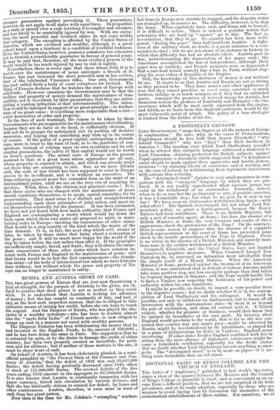A PROTESTANT CRUSADE.
Lean SHAFTESBURY "snaps his fingers at all the powers of Europe in combination." He asks, why, in the cause of Protestantism, Englishmen should be less bold than Queen Elizabeth ? "why behind Cromwell?" why less " fiery " than their brethren in America ?—The meeting over which Lord Shaftesbury presided when he uttered this energetic language addressed a memorial to Lord Clarendon, claiming protection for British subjects against Papal oppression ; a document which suggested that "a determined stand should be made against these aggressive and hostile demon- strations"—by claiming liberty of conscience and of worship, and in the case of refusal, by withdrawing from diplomatic intercourse with nations thus refusing.
The "determined stand" shrinks to very small measures in com- parison with the " energetic " language by which they are pre- faced. It is not readily apprehended what coercive power can exist in the withdrawal of an ambassador. Formerly, indeed, when to do so was but the preliminary to acts of positive coercion, it was a formidable step ; but what do we gain by it now in our day ? We have seen an Ambassador withdrawn from Spain—with what effect ? The Spanish Government did not adopt Lord Pal- merston's policy, or grant a burial-ground, because Sir Henry Bulwer had been withdrawn. There is no British Minister, but only a sort of consular agent, at Rome ; but does the absence of a British Minister at Rome, the very fountain and centre of these aggressions, cheek the pretensions of the Pope ? On the contrary, there is some reason to suppose that the absence of a complete British representation at the court of Rome has prevented some check to the hostile proceedings of the Pope in England. There is no virtue in the absence of a British Minister, and scarcely more than none in the sudden withdrawal of a British Minister.
Cromwell, Elizabeth, and the United States, have not limited themselves to negative measures. When Cromwell hanged Don Pantaleon Sa, he conveyed an intimation more intelligible than the simple recall of a Henry Bulwer. When the American Minister at Rome protested against the treatment of an American citizen, it was understood that in default of redress America might take some positive step, not less energetic perhaps than that taken by Captain Ingraham at Smyrna ; and the Pope would hardly like to have a Yankee row exposing the feebleness of his power and authority within his own dominions. It might be possible, no doubt, to impart a very peculiar force to the negative course ; but we doubt whether it is in the contem- plation of Lord Shaftesbury and his colleagues. It would be possible, not only to withdraw an Ambassador, but to break off all intercourse with the contumacious state—to treat it as beyond the pale of civilization, and shun all contact with it. A British subject, whether for pleasure or business, would then know that he entered its boundaries at his own peril. By keeping aloof, England would proclaim to the world, that so far as she was con- cerned that country was any man's prey—might be absorbed by Russia, might be revolutionized by its inhabitants, or played for in a game of fillibusterism by Poles or Yankees ; England never interfering. If other states besides England combined with her in acting thus, the mere absence of diplomatic intercourse might be- come a formidable retribution, especially for the feeble states. But we doubt whether Lord Shaftesbury intends anything so ener- getic. The "determined stand" is to be made on paper—it is no- thing more formidable than an ink-stand.




































 Previous page
Previous page